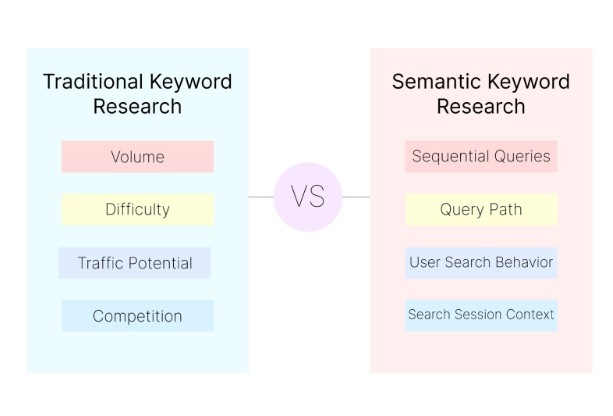Traditional vs Semantic Keyword Research

🚨 Why Traditional Keyword Research Just Won't Cut It Anymore!
📉 In traditional keyword research, you focus on:
- 🍏 Volume
- 🍏 Difficulty
- 🍏 Traffic Potential
- 🍏 Competition on SERPs
But there's a better way… enter Semantic Keyword Research. 🌐✨
🔍 In semantic keyword research, you focus on:
- 🍏 Sequential Queries
- 🍏 Query Path
- 🍏 Search Behavior
- 🍏 Context of Search Sessions
🌴 Sequential Queries
These are the queries users search for on search engines in sequence.
➡️ The queries in a sequence may not always be relevant.
🔄 Different session terms, entities, or entity types can result in irrelevant queries in a sequence.
💡 Pro Tip: Dive deeper into the sequence of queries that your target users write in your targeted contextual domain. You can create content items at your source to serve each relevant sequence of queries.
🌴 Query Path
A query path can be created by sequential queries.
📈 A query path can look like: Apple 👉 Banana 👉 Berries
🌀 Different permutations in a query path can affect document ranking.
🚏 A query path helps in identifying "content terminuses".
🔹 "Content terminuses" refer to specific endpoints or final destinations within a series of search queries.
🔸 These can change based on differences in the query path.
💡 Pro Tip: Figure out the content items you can publish on your website to serve the complete relevant query path, and how smartly you can reverse engineer that path in your internal linking strategy.
🌴 Search Behavior
This is the way users interact with search.
🔍 Search behavior and query path help adjust the "proportional relation to the likelihood" for relevance, and the context of the search behavior.
🧠 A search engine can cluster the queries based on their chronological order to identify a search behavior pattern.
📄 Documents selected for certain types of questions, entity types, or attributes can rank higher.
💡 Pro Tip: Search behavior analysis is a critical factor in modern keyword research. Go beyond just queries — figure out all the factors that impact user behavior.
🌴 Context of Search Session
For search engines, identifying the context of the search session is extremely important.
⚠️ Without understanding the context, it’s impossible to serve the best possible content.
📌 Google identifies context through sequential queries.
💡 Pro Tip: You need to figure out the context of search sessions for your targeted users.
👉 Serving intent alone is not enough, because context goes beyond the targeted query.
🗣 Users express context on multiple platforms:
- 📱 Social Media
- 👥 Communities
- 📺 YouTube
- 🔍 Other Search Engines
📝 Identify the context and express it clearly while creating and optimizing content items at your source.
